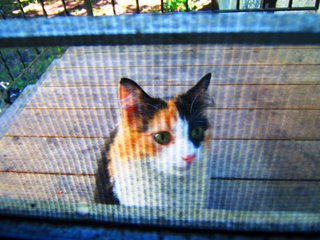
{this is a calico cat that lives a few houses down, who likes visiting us & sleeping on our porch. his meow is very plaintive & sweet & yowly.}
I have been thinking a lot lately about sound, & how we remember sounds, how we store aural memories. Not so much the process of how we remember the things we hear, the songs or facts or stories, but how we recall the quality of sound, its texture, resonance. How we conjure up the particular tone of someone’s voice, the sound of wind moving through lodgepole pine trees, the scratchy squawk of magpies in the morning – how we remember the details of the soundscapes we inhabit.
2 comments:
I like listening to The World This Weekend on CBC (among many of the other shows) because they always take you tours of places, and obviously they have to do it completely in the aural domain. I suspect people that do radio probably become experts at hearing.
indeed... i love hearing the background sound as reporters speak. CBC seems to pay extra close attention to such things, it seems, & they often use it in very evocative ways.
Post a Comment